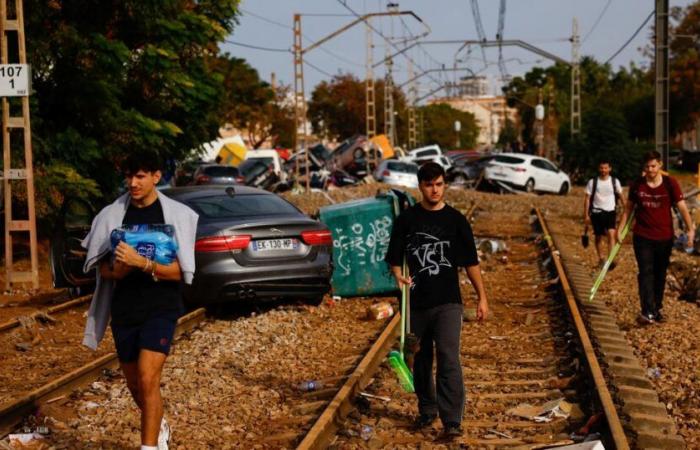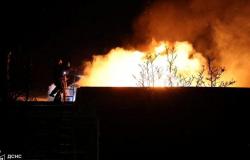IN PICTURES – This week’s floods in the southeast of the country have killed more than 200 people. Four regions have been placed on orange alert and the province of Huelva, in Andalusia, on red alert this Friday.
Spain, which is licking its wounds after the apocalyptic floods of October 29 and 30 which left at least 205 dead, continues to hold its breath. This Friday, November 1, the Spanish Meteorological Agency (Aemet) placed on orange alert for risk of rain part of Andalusia, the Balearic Islands (except Ibiza and Formentera), Catalonia and the community from Valencia. In the southwest of Andalusia, the province of Huelva has been placed on red alert.
The Valencia region, by far the most bereaved by the torrents of mud which devastated the south-eastern part of the country during the night from Tuesday to Wednesday, alone accounts for 155 deaths. To which must be added two deaths in the neighboring province of Castile-La Mancha and one in Andalusia. On Thursday, the Minister of Territorial Policy, Ángel Víctor Torres, announced that searches were continuing to find “dozens and dozens of missing”.
This Friday, the Spanish Minister of Defense, Margarita Robles, announced the arrival of 500 additional soldiers in the south-east of Spain, to reinforce the 1,200 already present, to participate in aid operations for flood victims murders of this week. These soldiers belong to the Military Emergency Unit (UME), which intervenes during natural disasters.
”
data-script=”https://static.lefigaro.fr/widget-video/short-ttl/video/index.js”
>
“Without electricity”, “lack of food and drinking water”
In Chiva, west of Valencia, The Country recounts the ambient chaos and the desolation of the local residents. “Residents cannot call each other by telephone. They have no way of locating their missing people or listening to the radio. They don’t know for sure what’s happening in their city, let alone those around them. They know what’s happening to them through word of mouth.”narrates the most read newspaper in Spain.
“Those who maintain their homes cannot flush the toilet or flush the toilet. There is a lack of food and drinking water. Since Tuesday, when the storm dumped 420 liters per square meter in the area, these nearly 17,000 inhabitants have been without running water, without electricity, without a telephone network, and even less internet.describes everyday life. In another article, El País also tells this “citizen solidarity” which made it possible to accumulate “food, clothes and blankets”. But, adds the daily, “the problem now is to distribute them”.
”
data-script=”https://static.lefigaro.fr/widget-video/short-ttl/video/index.js”
>
“The wall saved Valencia”
For its part, El Mundo traces the history of the Turia river canal, an infrastructure created to protect Valencia from major floods like the one that devastated the city in 1957.
“Half a century after its construction, this architectural work demonstrated that it was capable of supporting flow rates of 2,000 cubic meters. It was the wall that saved the capital from destructive effects [des intempéries]. However, there was nothing he could do to prevent the water from overflowing on the other side of the river.explains their reporter in an article entitled “We are in a war zone. We lost everything”alongside the victims of La Torre, a district of Valencia where ten people died.






